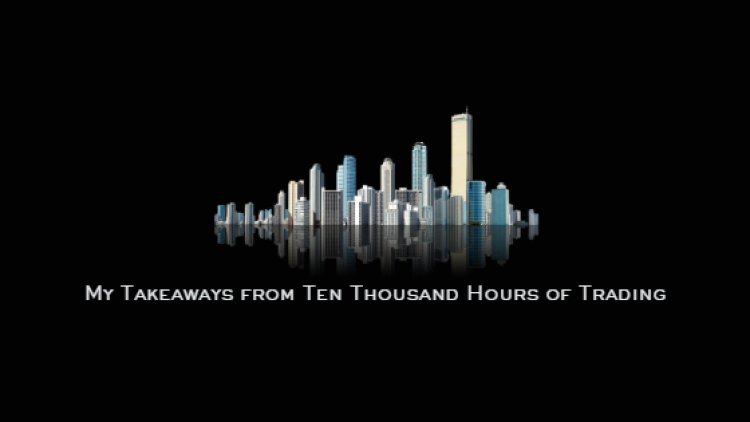My Takeaways from Ten Thousand Hours of Trading
Today marks the beginning of my four-year trading experience, which I have recorded in detail. So that you may avoid making the same mistakes I did and instead become a successful trader far more quickly, I will share with you the seven most important lessons I've learned over my whole trading adventure.

My Takeaways from Ten Thousand Hours of Trading
Today marks the beginning of my four-year trading experience, which I have recorded in detail. So that you may avoid making the same mistakes I did and instead become a successful trader far more quickly, I will share with you the seven most important lessons I've learned over my whole trading adventure. Trading is a difficult method to generate money, and that is the first lesson. It could be the most significant one. Trading for easy money isn't a hoax. A slow but sure way to earn money is scheme trading. In other words, trading is like running a marathon. Let's be real: this isn't a race. We all got into trading with the idea that we might become millions in a flash. However, the more we do it, the more we realize that this isn't the case. While it's true that beginners can experience occasional wins, those profits will quickly be gone. Then, when we hit a losing streak, we become even more confused and lose even more money. Eventually, we let our accounts get out of hand and stopped trading altogether. Among traders, the top 1% earn more than physicians, scientists, and attorneys combined, and they also have greater discretion with regard to when, where, and how they spend their money. A number of hedge fund moguls amass billions of dollars annually from trading.
Are you seriously under the impression that you can achieve this goal by mastering the skill of chart drawing alone? Are you seriously believing that you can turn a profit in a month or even a year? I mean, everyone can plot a line on a graph, but no one is ever really making any money. It takes years and years of practice to become an expert trader. Because of this, I believe it is simple. Do not treat this creative form with disdain. You can witness all my public triumphs—like taking my family on vacation, treating them to fine restaurants, and even purchasing my first Rolex—on my Instagram.
You can't see the minor victories, the steady breezes that have built up every day for the last four years, or the many evenings spent studying and trading in my tiny room by myself. Even though most people don't know what I do for a living, there are certain mornings—like when I get up at 5:00 in the morning—when I see myself accomplishing my trading objectives. These are the moments when I feel like abandoning myself after blowing up a lot of accounts. Even now, before you ever consider teaching me to trade or even how to read charts, I still live like a monk and labor like I'm broke. The whole shebang focuses on fundamental analysis and risk management.
You must carry this out.
Everything you do will be in vain if you neglect this one critical step. If you are self-destructive, no amount of chart knowledge can ever help you become prosperous.
That one aspect is faith. Trading is challenging, but believing is more important. If you doubt your abilities, you will never succeed. When it comes to beliefs, the ability to build or destroy is in their hands. Your brain will go to great lengths to back up your self-confidence once you have it. Play the long game because your belief in your ability to become a great trader will drive you to take the steps that will improve your trading skills and discipline you. In all likelihood, a year will not be enough to get there. Even if you don't see regular earnings after two years, you'll get there if you keep going and show up every day. If my son isn't ridiculed because he has his dad's money and a beautiful mother, then I have failed as a trader, and I will have worked alone. That's my life credo.
The execution of your transactions is entirely up to you. When it comes to managing and coaching yourself, it's just you against yourself. Because you're on your own in this market, you're also your own greatest opponent. When it comes to your personal trading account, you pose the most risk. One poor choice might deplete your whole account balance if you aren't attentive. You need to tune out the noise and concentrate on your own trading path rather than trying to mimic someone else's attributes word for word. What works for him might not work for you. The second most important thing I've learned is that sometimes it's okay to lose. Changing your mindset around losses is essential for long-term trading success. There are costs associated with trading because it is a business. As a result, you need to write off your losses as costs to the company. When I trade next time, I won't be expecting to win, but rather that anything may happen; the greatest traders learn from their failures and go on. So I may change course in response to market conditions. This should be your frame of mind if my viewpoint is essential. While it's true that all traders experience losses, not all losses are equal. Every setback has its upsides. The amount of money you lose is not the determining factor in whether a loss is good or bad. Consider this scenario: you're following your trading plan, you've attended all the necessary conferences, you've set your stop loss correctly, and you're trading with a comfortable lot size. However, out of the blue, unexpected news causes the entire trend to reverse, and you lose money. For me, that's a good loss—you stick to your strategy, and it's not your fault that the deal didn't go according to plan, but you still feel frustrated and unhappy about it. Your trading plan is obviously no longer important to you.
I don't think the confluences are important to you. You go into the next trade at random, not considering any confluences, or you're desperate to recoup your losses, but you wind up losing again. That's why I suffered a setback; in this context, a positive loss would be a threat that backfired. Poor losses occur when you act on impulse rather than strategy, even when you stick to a trading plan and employ the right position and size. Bad losses have hit everyone now. Being able to spot these mistakes and grow from them is crucial. As a matter of fact, the most instructive lessons typically come from the most devastating kinds of losses—bad ones.
If you pay attention, you can learn a lot from suffering; for example, you can utilise it to break bad trading behaviours. Personally, I didn't start studying trading psychology until I lost $9,000 in a single day. When you're trading, sometimes you have all the confluences in the world, and you just follow your plan and take trade after trade. But that day, the pain of loss was so great that I realized I had to rethink my trading strategy. You need to be okay with seeing rain when you do have good losses; accept it, learn from it, and go on; don't beat yourself up over it. That's the reality of trading. No matter the outcome, as long as you stick to your trading plan and approach, every deal is a win. Just remember that you're either one good trade away from becoming successful or one poor thread away from becoming broke. The third lesson is trading, a video game. When I was a teenager (about 13–16 years old), I had a serious addiction. I used to rush off to catch the bus home at 3 o'clock in the afternoon so I could play games all day. My favorite first-person shooter games are Counter-Strike: Global Offensive, Fortnight, and Player Unknown's Battlegrounds (PUBG), and when I get home, instead of taking a shower, I fire up my laptop and start playing.
Because of the laptop's performance at the time, I could only manage 30 frames per second; on occasion, the latency was so severe that I felt like I was being transported from one location to another. That's the extent to which the lag was bad; my parents still wouldn't upgrade my crappy laptop, no matter how much I begged them on my birthday. On most occasions, I'd join a Discord server and play games with my pathetic friends until midnight, at which point my mom would call me and tell me I wasn't getting enough sleep from playing video games, so she'd make me get in bed by twelve or one in the morning.
After I put her to bed, I plan to sneak back into the living room and play games until two in the morning. Then I'll go to sleep and wake up at six in the morning. to attend classes. My whole adolescent years were much like that. At one point, my mom became so enraged that she swung a baseball at my display, causing it to crash. I was furious because it seemed like a few pixels had gotten up, and the monitor never worked again. I stormed out of her presence and pounded on my bedroom door. In hindsight, I can see why she acted the way she did. For me, video games were an escape from the real world. For the sake of achieving virtual world dominance, I would level up in Fortnight. Why? I drew back from facing reality because I was weary of failing at life's challenges. I was actually lonely, broke, sad, and insecure. Now you've been brainwashed into thinking that the typical way to succeed is to go to college, obtain a good job, and retire at 65. Then you can relax and enjoy life. You should be scared because this will show you the reality. The traditional game is unnecessary for you to play. Since you're here, I'll give you props for not wanting to play the typical game. You're free to swap games whenever you choose.
Being a typical middle school student is something you'd rather not do. Now, video games are entertaining because you can level up and earn greater rewards; view life as a game; view trading as a game; and become an expert trader if you want to escape the system and enjoy the perks enjoyed by the top 1% of traders. Selecting which markets to trade in becomes like picking a player as your trading skills improve. When you earn money through trade, you level up your character. Your player is benefiting from your point-stacking. Get to the point where you can win the game by consistently making gains from the market and unlocking higher levels. Stack trade goals, get new experiences, and eventually obtain access to freedom. Surely you must realize that trading is nothing more than a game. So, instead of thinking of your trade objectives as in-game tasks, try to level up your trading skills. Get your bearings again—that's the fourth lesson. Over the course of my ten years, I would spend a lot of time playing video games and looking for the best 18+ stuff to feed them. My noodles before bed, and because of all the contemporary distractions, my life has been terrible, and I've longed to end my life. The quality of your life is determined by the things you concentrate on the most; therefore, reclaiming your concentration is essential if you want to become a great trader. It follows that you will achieve little in life if you primarily occupy your time with playing video games and watching Netflix.
But you may have a good start right now if you devote most of your time to studying and trading. In trading, you don't earn money by working hard; rather, you earn money by making smart decisions, and you can't do either of those things without a calm and collected mind. So, even if you don't see results in a month or two, sticking with it for five or even ten years will yield tremendous rewards. For example, you may be in the middle of a 10-entry thread that demands your undivided attention since you're now scalping. The second you check your phone for a text from your girlfriend, you might as well not have answered it, and you might have missed a major opportunity.
Trust your analysis and let the trip unfold; however, when it's time to focus, put your phone away and give the charts your undivided attention, just as you should right now with this video because you need to be completely absorbed or you will lose to the person on the other side of the market. Can anybody else maintain such a laser-like concentration? The reason being, that his desire for it outweighs yours. Watch this video on my second channel if you're interested in learning how to enter a state of deep attention and flow when trading. Profits aren't everything, as we learned in the sixth lesson. Ever since I had less than a hundred dollars in my bank account, I've kept this a secret from everyone. One of the reasons I work so hard every day is because I want to feel empty inside. For some reason, I always assumed that having more money would solve all my issues and make me happy. However, I was wrong; in fact, as my financial situation worsened, my contentment remained mostly unchanged. There are more people relying on me, more team members to oversee, and more duties to do now. Thanks to my trades and enterprises, I've been able to earn $1,000 per month, $50,000 per month, and $100,000 per month all in one go. Regardless of fluctuations in my salary, I never felt any difference in how happy I was. When your monthly income reaches $10,000, you won't notice much of a difference in your level of satisfaction compared to amounts below $10,000. For example, imagine you've hit it big and treated yourself to a shiny new Rolex and a stunning matte black g-waggon; now you feel like a million bucks. If you're complacent, you'll fail. Making the initial $10,000 a month is easy; keeping that money steady month after month is the real challenge.
The market will humiliate you, put you in your place, and reveal your complete and utter worthlessness; therefore, return to your labour and abstain. On occasion, I will have extreme feelings of solitude. Unlike most of my peers, I don't go out drinking very much. Going out with friends isn't something I often do. There is just a tiny circle of close friends of mine. My romantic partner is nonexistent. I'm not a freak or anything; I just appreciate all these things. I simply can't take my mind off of developing and trading right now. Although these goods could satisfy my desires in the here and now, I know they cannot satisfy my needs in the long run. What matters to me are the things that can make me happy in the long run. I prefer to keep my dating life private; therefore, no one outside of my inner circle knows this. In a very private matter, I ended a one-year relationship with my partner around six months ago. I am utterly devoted to her. My first love was with her, and first loves are the most painful. She is a wonderful lady who deserves the best, and I love her very much, but I chose to end our relationship in part because I needed to give my whole attention to my trading career. For the trade gig, I was planning to go all out.
Not only was I a regular YouTube video poster back then, but I was also developing the trading blueprint course and trading on the site.
Being the kind of man who puts his purpose first, it was really challenging for me to keep the relationship's priorities in check. As a result, I will oftentimes ignore her. It took a lot of sacrifice on my part to get to where I am now. I enjoy video games, drinking and partying, and dating multiple women. When my friends asked me to hang out, I would decline because I wanted to stay home and study trading. I once screamed at my mom because I was so stressed and sick of being alone in this race where no one really got me. Aside from my family, my mission in life is what I cherish most. In order to stay focused on my objective, I am able to let go of all these vices and pleasures. In order for me to be able to face each day in harmony with my purpose and goal, Truthfully, if you don't make a sacrifice for your desires, those desires will eventually become the sacrifice. Earning money on your own isn't exactly a picnic. For that reason, trade does not bring me genuine joy. Traders are a blessing to me. Life isn't about maximizing one's own financial gain; rather, it's about making a positive impact on the lives of others, adding value to the world, and assisting those in need. Truthfully, money isn't important to me. Creating these videos for you guys brings me the greatest joy because I know I'm making a difference in so many people's lives and assisting them in becoming successful traders.
In the same way that I have done for myself and my pupils. This is something I never thought I'd feel until lately when random strangers started approaching me in public places like the gym or the streets and asking, "Are you the trading geek?"" I would often be very shy, but I would always be polite enough to have a conversation with you and find out, How did you find out about the trading gig? How have my videos helped you out? And because of the trading gig, my life has a purpose and more meaning, so know what you want in life. All your energy and time into what's important to you, because everything you won't sacrifice takes you away from your goals. Teaching is the sixth lesson. If you want to learn something, read about it; if you want to understand something, write about it; if you want to master something, ditch it. This is a quote by Yogi Bajan. The best way to learn is by teaching. If you can't teach it, you don't understand it well enough. That's why I'm able to simplify all these complicated trading concepts into something a five-year-old can understand. That's because I know I fully understand what I'm teaching here on this channel because I'm speaking from experience; I myself have blown multiple accounts. I have lost thousands of dollars from trading, and I've committed every single trading mistake out there, be it revenge, trading, crossing trades, or chasing trades. All these mistakes have been there since I first started the trading gig.
How to trade I was the underdog who was still losing, and I was barely making any profits. That's why I could relate to the audience—the people watching my videos. I knew exactly how they felt because that's how I feel as well, and I knew what to do to get out of that because I had managed to escape that myself. I myself was researching how to become profitable, and I was still trying to perfect my price action trading strategy. I wasn't necessarily the millionaire trading guru who already made it the guy who drives fast. Cars live in big mansions and have a thumbnail of them holding stacks of cash, and when you click on the video, you will see them showing you the meta, trader 4, with 1 million dollars in demo profits. I was an average guy who came from absolutely nothing, and I was trying to build my trading empire from scratch. Just like you, I was using my iPhone 7. I found a $20 microphone on Amazon and a laptop for $300 to $500 that still has a home button on it. To begin with, I am utilizing a $4,000 camera, a $2,000 Macbook and a $1,000 setup to record my videos. Furthermore, the creation of my entire studio costs over $10,000, and some of my video editors are compensated more than the average nine-to-five worker. It's all because I want to make higher-quality videos for you guys, and now we have over 45,000 people on our discord server, the trading tribe, and over half a million subscribers on YouTube, which is absolutely mind-blowing.
Given my current state of mind,
Now that I'm saying it, you don't become a master because you are able to retain knowledge; you become a master when you can release it anyway. If you want to learn to trade quickly, consider trying the Feynman technique. One learning step: two: ditch it to a child step; three: share it with the public, your friends, or your family step; four: review the feedback and adjust from there. The seventh lesson is trading. Psychology, Mark Douglas Is there this famous quote where I can say that the consistency you seek is in your mind, not in the markets? Most traders agree that trading is 80 psychology and 20 analysis, but at the same time, most traders don't spend 80 percent of their time working on their psychology. Instead, they spend 100 percent of their time on analysis. Finding the best trading strategies on YouTube Staying at charts all day and taking loads of trades without thinking it through to master your mind requires trading discipline. Trading discipline is the most important skill that you need to have if you want to become a successful trader, but almost nobody has it. Therefore, since you merit it, I would like to present you with a special offer if you are still viewing this. So here are 10 trading, psychology, or trading discipline tips that you must follow.
Stay committed to your trading strategy, know when to enter and exit, and always use a stop-loss strategy. Don't let your emotions dictate your trading decisions; accepting losses is part of the game. Instead, concentrate on the quality of threats, not their quantity. Avoid analysis paralysis by being a lifelong learner and reflecting on and learning from your mistakes. Patience, understanding, and waiting for the right trade to come your way If you want to master your mind and become a profitable trader, I have a complete course on how to eliminate emotional trading that you can watch here. And remember, all it takes is a single trade!
TradeFxP Features
If you choose to be a self-employed retail trader, here are a few things we offer:
-
The best trading Platform
-
No Requotes
-
Lowest Spreads
-
High-level liquidity
-
Interbank connectivity
-
Pure STP/DMA/ECN
-
Free signals
-
Best support
-
Crypto Wallet and withdrawals / Deposits (USDT)
-
Robust CRM
-
TradeFxP wallet
-
Once click withdrawal
-
Multiple payment options
-
Local offices to walk in
-
Free VPS
-
Free Video Chat / Virtual Meetings
-
And many more…
If you choose to be a part of our managed account program:
-
All of the above +
-
1-2% Daily Profits
-
High-level risk management
-
Capital protection
-
Only 30% of the capital used
-
Negative balance protection
-
Our fee is from the profits only
-
Monthly profit withdrawal
-
Wallet system – Use it like Phonepe, or Google Pay
-
Crypto wallet and withdrawals / Deposits (USDT)
-
Live monitoring
-
MyFxbook Live monitoring
-
Copy Trading
-
And many more…
Optional: If you do not withdraw your profits for 2 months, our system will use those profits to trade and will keep your 100% capital safe and secure for margin purposes. This is optional, and if you choose not to be a part of it, you can withdraw your profits from the first month itself.
Why 1-2% daily? Can't your managed Forex account earn more?
Yes, we can! Remember: greed may be good in the beginning, but in the end, it will destroy everything. You and I know that! Many droplets make an ocean! Join the Managed Account Program and sit back for six months, then look at your account. You'll see that our strategy is good and the best. Do you know what I mean?
If you choose to be a part of us as an introducing broker (IB) or channel partner,
-
Industry best Rebates
-
Local Office support
-
Staff support
-
Marketing support
-
Marketing materials
-
And many more…
Having said that….
You can join our Forex Managed Account program and earn 1-2% profits daily. See for yourself by clicking the below link.
Have a great journey, and may you catch some big waves on your way to prosperity!
To see Ai Forex Trading for real, use these credentials.
-
Low-risk strategy:
-
Mt4: 112018
-
Pw: Allah@101
-
Server: tradefxp live,
1. To read why you should be with us, click here.
2. To open an account, click here.
3. To see our regulation certificate, click here.
4. To see our news with the IFMRRC, click here.
5. For claims, click here.
6. For the main site, click here.
7. For blogs and articles, click here.
8. Main Website: www.TradeFxP.com



 admin
admin 










